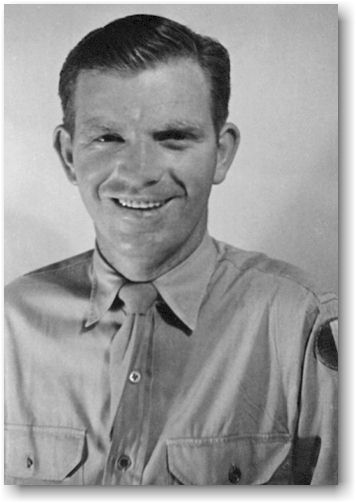
Wes Clark in
Germany During World War II
FORWARD
by Wesley Harry Clark, Jr.
My father, Wesley Harry Clark, served in France and Germany during World War II as a light mortar crewman with Troop "C" of the 33rd Cavalry Reconnaissance Squadron. His rank was a Technician Fifth Grade. Like many other veterans, he didn't talk a lot about his experiences there. When I could draw him out, he mostly described how pleasant France was. I also recall a tale about the bivouac in an ancient chateau in Mainnemare, France - and of using the sanitary facilities, which consisted of leaning out (fore or aft) from the battlements. Most of his enlistment, however, took place in Fort Riley, in Kansas, where he had a responsibility to groom horses. According to him, this was a miserable affair since the horses were adept at dirtying themselves after being cleaned.
He once told me that while in Europe, he met Pablo Picasso, and had him scribble a drawing in his inimitable style on a match book in exchange for a pack of cigarettes. Dad got somewhat upset when Picasso refused to sign the matchbook. No, I do not own this lost work of art.
Dad's military record is here. From it, we can see that he was drafted on February 20, 1943, and spent five months and 27 days in Europe. He arrived back in New York on 2 August 1945.
One of his keepsakes, stored for many years in an old suitcase, is an orange paper booklet. It's a narrative of his unit, written by an unknown unit chronicler. I have scanned it and present it below, with photographs Dad took using a "liberated" German recon camera. Apparently this camera was mounted on the underside of a plane and took shots on a long stream of film. I do not own the camera or the negatives produced by this camera, unfortunately. All I have are contact prints. My comments about the images are in brackets.
Dad passed away in Burbank, California on 20 August, 1983.
I am proud of my father's service in the United States Army, and present this document in memory of my father, and of the many, many other men who fought the evil of the Third Reich. It is my hope that this document may also serve as a genealogical source for others. If you are related to one of the men who served with this unit and want a copy of this document, you may download it from this site. If you maintain a World War II or military site, you are also permitted to copy this text.
NOTE: Written on the back of the book, in pencil, is: "Wess please use a newspaper when you pour your paint. I can't get it off this glass top. Mrs. H" When Mom and I were sorting through old suitcases and came across this, we both laughed, as Dad was a rather slipshod and careless painter.
September 2004
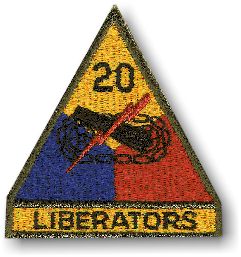
Troop "C" -
33rd Cavalry Reconnaissance Squadron
(Part of the 20th Armored Division)
In Europe
Author Unknown
It was snowing at Camp Myles Standish on the morning of 5 Feb. 45. A soft, limp, clinging snow that fell in large flakes to settle on bags and equipment and filter beneath your collar. It was about 0400 and the troops were lined up on the road by the number chalked on their helmets. Then the order was given in the quiet stillness and the troops sloughed slowly ahead to the trains waiting on the ramps.
The short ride to Boston was crowded, tight and uncomfortable but in an hour we were there and dismounted to reform under the sheds of the loading pier. Red Cross girls passed among us handing out donuts, coffee and chocolate. Then there was another order, the band played "Don't Fence Me In," and in single file we started up the gangplank to our compartment deep within the bowels of the ship.
Sure, we were nervous. The North Atlantic is cold in February and all of us were going to be a lot farther from home than we had ever been before. We sailed the next day and don't think the after rail wasn't crowded with guys saying a quiet goodbye. Their excuse was they wanted to see how the land looked slipping away.
Somewhere between Boston and Le Havre our sleep was interrupted by a few depth charges dropped by our destroyer escort. They have a disheartening sound when you are below the waterline. So much so that one of our men made it from his bunk on G deck half way to B deck dressing as he ran before the reverberations had died away. We laughed. But on second thought those terrific concussions aren't very funny.
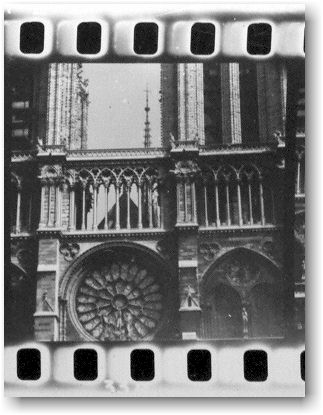
We spent two weeks on the "Thomas H. Barry" and they were not good weeks. We were crowded, ill fed and laid low by that malady known as sea sickness. Our ship was the old White Star liner "Oriente" and many a night on our canvas slings we lay wondering at the sudden lack of com-fort, since the Army had rechristened her. France and the War were not things to look forward to but after the "Barry" we welcomed going ashore.
Before dawn on Monday 19 Feb. 45 we disembarked at Le Havre, France and went ashore by way of a temporary floating pier. The harbor was a complete shambles. We were hustled into open semi's and transported some eighty miles inland passing through Rouen.
By mid afternoon the trucks stopped at a large deserted chateau just off the Paris-Dieppe highway in the little village of Mainnemare. This was our billet during our stay in the theater staging area. The chateau, a large, solid structure setting purposely amid landscaped grounds, had been vacated earlier in the winter by a unit of German mounted cavalry. Still more re-cently it had housed an American tank Destroyer Company. We were the building's third party of invasion guests.
[My father visited Paris at some point, and took photos. Two instantly recognizable landmarks are the cathedral of Notre Dame and the Eiffel Tower. Apparently Dad found the women walking in the streets pretty noteworthy, as well, and they became a frequent subject for his camera. - Wes Jr.]
Later in the same day we were joined by "B" Troop of our Squadron. There was the usual discussion and division of quarters which gave "B" Troop the Southwest portion of the chateau and grounds. By nightfall "C" Troop was somewhat dubiously at home in the Northeast section.
Reveille of the 20th put us back on garrison duty. We began to lose our sea legs with calisthenics and close order drill. Refresher classes in basic fundamentals helped clear the salt from our memories while we awaited our heavy equipment.
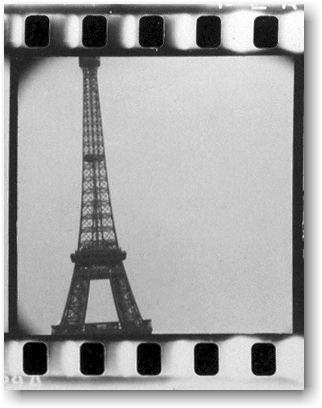
On 22 Feb. the entire second and third platoons left for special duty at Rouen. They returned on the 28th after working on the docks unloading cargo ships.
25 Feb. brought our armored cars and T.A.T. Our duties changed to un-packing, cleaning and adjusting equipment. We hurried to put everything in readiness. Maintenance set up in a private garage on the grounds and we began to function.
Things went along more or less usual and regular until 14 March when we were invited to attend a demonstration by Army Intelligence. It was by far the finest exhibition we had yet seen. German uniforms were explained and, identified in a manner easily understood. Counter-espionage was cov-ered nicely. We saw and examined enemy weapons and demolitions and watched comparative firing. By the end of the day we walked home a much better informed troop and very appreciative of their efforts.
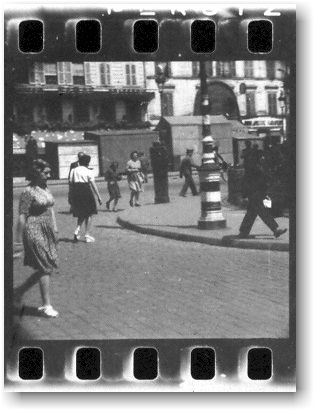
A Red Cross unit visited us on 20. March. They brought donuts, coffee and cigarettes. Their brief stop was a pleasant event.
One officer and eighteen enlisted men left 23 March for convoy duty.
They ferried peeps into Germany and returned 27 March. They were close enough to the front to see artillery flashes.
Our peeps arrived Monday, 26 March and were rapidly put into com-mission. We were nearing the day when we would be ready to move out.
Our alert came at noon 28 March. At 1900 we were on our way. We moved in a slow, tedious convoy during the usual intermittent rain. Our route lay generally East by North. Thursday, 29 March, at 0830 we entered Belgium on the road to Mons. At 1730 of the same day we crossed the border into Holland near the town of Maastricht. By 2015 of the same day we were in Germany and a few minutes later passed through Aachen. Our billet was in a partially occupied hospital in the town of Bardenburg, about five miles Northeast of Aachen.
Bardenburg is located in the center of a large industrial area. It is surrounded by a multitude of factories. Most of them have been hard hit by our bombardments but in one building not so badly hit an Ordnance unit had set up. They were quite decent about allowing us to use their equipment to finish the modifications on our vehicles. We used welders, burners and me-chanics from the troop and worked a 24-hour day till the work was finished. That used up Easter Sunday, April 1st and the day following.
Saturday night, 31 March, the third platoon went on our first patrol. They accomplished their mission and returned with negative information.
Just before dark on Tuesday, 3 April, the Squadron moved up to the Rhine in the sector between Cologne and Dusseldorf. It had the mission of outposting that area which was being vacated by the 97th Inf. Div.
C troop's area was from Zons to Dormagen. We reached our objective on the morning of April 4th with a platoon of light tanks and a platoon of assaults guns in support. The 97th had withdrawn earlier in the morning without waiting to be properly relieved. So we moved into their positions which had been unoccupied some five hours. We were to hold until relieved by the 101st Airborne.
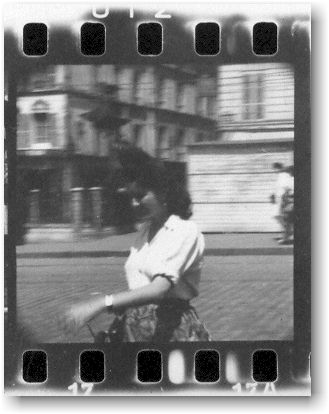
We had a quiet day along the Rhine. The German installations across the river were clearly visible to our observers even as we were in a position to be seen by them. The day passed without a shot being fired although the troop on our left flank engaged in a fire duel with small results. Coming darkness brought the forward elements of the 101st so we were free to return to our billet at Bardenburg.
The days activities were notable in several respects. As it was our first physical contact with the enemy it brought to mind many basic principles which are so easily forgotten and so difficult to do without. It made us all a little more anxious to be on our toes. In the back of everyone's mind had been the unadmitted reluctance to enter a fierce battle on our first time up. This mission enabled us to get the "feel" of action with comparative safety.
Another fact worthy of consideration was the marked change in the men's attitude toward each other. Since leaving the States we have all been constantly exposed to "cabin fever," which is a mental disease brought on by too many men in too little space. That is, a cramped existence with too few opportunities for diversified relaxation, displeased with everything and occupied by morose boredom. That day along the Rhine such small things were forgotten in favor of the bigger show. Full cooperation stood high above the discord. We were a little better equipped now for whatever might come.
The remainder of our time at Bardenburg was spent on maintenance, ordnance checkups and last minute instructions. We rode a few road patrols but in the main merely occupied ourselves while awaiting orders. On 8 April we were ordered from Bardenburg to Krefeld-Verdingen to perform a recon mission for CCR. We left at 1340 and by 1600 had set up our CP in Krefeld. We were to reconnoiter the area held by the 94th Inf. along the west bank of the Rhine. It was decided to use the remaining hours before darkness for a brief check of our zones. At this time the pocket was strongly held by the enemy and their positions across the Rhine were clearly visible. We drew fire but did not compete with them as ours was a simple recon mission and our time limit allowed for little else.
By dark the platoons had all returned to the CP at Krefeld for chow and billet. We were to continue our work the following morning but during the night our orders were changed and we were recalled to Bardenburg.
At 0800 on 10 April we left Bardenburg driving deeper into Germany. By 1300 we were crossing the Rhine over a Bailey bridge in the vicinity of Bonn, which was to the South of the pocket. At 2100 we were in our billet at Breitscheid. Distance covered - 135 miles. The CP remained at Breit-scheid until 13 April but the platoons went on outposts and road patrols. It was during this period that many of us were fortunate to get hot showers and clean clothes. About this time we discovered the abundance of deer. The outposts often cooked individually so many a menu sported fresh deer meat.
On 13 April the troop moved 27 miles to Laasphe and set up its CP and billet in another hospital. The platoons immediately began their work of searching out ammo dumps, PW camps, likely spots where guards might be needed and spotting DP areas.
Through the period 13 April to 19 April the CP remained at Laasphe while the platoons continued to probe their zones. We began collecting weapons, Ammo, field glasses and cameras from the surrounding towns. The accepted procedure being to inform the Burgermeister of your intentions then on the following day return to collect the contraband he gathered from his villages.
Soon our CP took on the air of a combination weapons collecting point and dime museum. Many of the arms were new and modern but some dis-tinctly belonged in glass cases. We were permitted to select a few sporting rifles, shotguns and swords to send home as war trophies. At this time came the boom in pistols. Everyone placed them high on his personal priority list. Soon the men were sporting every size, type and caliber produced in Europe. As was to be reasonably expected our motor park in the hospital court soon became a firing range of the "Oh-I-didn't-know-it-was-loaded" type. Holes began to appear in walls, windows and vehicles where no holes ought to be. It then became the troop policy that weapons would not be toyed with, but if you must experiment do it out in the hills. Sword play did not become popular due, at least in part, to the fact that fencing closely resembles calisthenics.

We became acquainted with the strong feeling between the Russians and the Germans. Often we were called out to quell small disturbances, Rus-sians who had been slave labor on German farms were rising up. Fights and beatings were an everyday occurrence.
Our job at Laasphe became larger when our duties included explain-ing the principles of military law to each Burgermeister. Checkpoints were set up and all persons moving through were inspected. The movement of large numbers of DPs and returning military was causing a huge prob-lem of both transportation and supply. The country was not able to feed and care for the people on the road. It became necessary for our check-points to collect them and evacuate them by groups.
We had fun at Laasphe. Our work was pleasant and occupying, with little outside interference. The setting was picturesque amid the high rolling pine clad hills. Following a map was an adventure. The roads on the ground were seldom as good as those show on the map. Many a secondary road, though plainly marked on the map, proved to be little more than a cow trail upon investigation. While checking one of these alternate routes we came across a very old castle high atop a hill. It was old and historic but the princess certainly belonged to this generation, she was young and pretty and quite generously escorted us through the huge affair.
We left Laasphe on 19 April and then began the rat race that lasted till V-E day. We were constantly on the move attached to first this command then that command. We worked with division after division and before the war ended we could truthfully state that at one time or another we were part of every American Army on the Western Front. Events happened too rapidly for an accurate account to be kept. Mostly the troop worked by platoons and almost every mission necessitated breaking the platoons down into teams. It is impossible to draw a word picture of the part each team played. The troop's CP moved every day and sometimes oftener. The platoons and teams stretched out like so many fingers. It was not unusual for the CP to move and radio new areas to the platoons. At times several days would pass before we would all be together again. Here, then, is the route of the troop. But it must be remembered that this route is not necessarily that of the platoons and teams. Their paths were far too numerous to men-tion.
From Laasphe we drove 226 miles to bivouac in the vicinity of Ochsenfurt. On the 20th we moved six miles to the far side of Marktbreit. On the morning of the 22nd Lt. Cornelison, Tec 5 Kelly and Tec 5 Holt were ambushed while seeking our next billet. Only by much crawling and dodg-ing was Lt. Cornelison able to escape. From his report Tec Holt was listed as captured and Tec 5 Kelly as missing. All this could have been avoided had they not been directed down the wrong road. Also on the 22nd the troop left Marktbreit in favor of Herfersbach some 58 miles up the road.
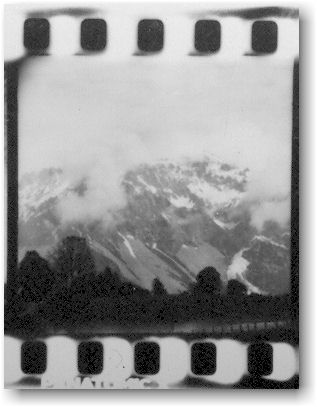
On the 23rd it was five miles farther to Abenberg. There we assembled to spearhead the drive into Munchen. While awaiting the jumpoff time the push was delayed and we were relieved. On the 24th we moved thirty miles to Megasheim. We outposted CCB and took three PWs. During the 25th we reconnoitered for CCB and took twelve more PWs.
The 26th saw us moving thirteen miles to Herblingen where we began clearing towns of DPs, PWs, weapons and ammo. Four PWs were rounded up. On the 27th we advanced twenty-eight miles to Salzdorf as advance guard for CCR. Picked up only one PW. We crossed the Danube into Heim-persdorf on the 28th. The 29th put us in Kollbach after driving forty-eight miles and picking up 183 PWs. From Kollbach to Goldach. twenty-seven miles, on the 30th we were leading the Division. That day brought 106 PWs.
On May 1st in troop formation we drove twenty-seven miles to Kirch-eon. Along the way we picked up 206 PWs, and shot down four German planes and one probable who had the poor judgment to attack our column. One plane, an artillery observer, must have radioed our approximate position just before we knocked him down as several rounds came our way a few minutes later. The bursts were wide and fortunately their observer wasn't able to readjust.
Before leaving Kircheon Tec 4 Overn Larson had the poor luck to be ac-cidentally shot while mounting his armored car. The bullet passed through his shoulder and the wound was not serious. On that same day, May 2nd. we moved eleven miles to Ebrach and picked up 69 PWs.
On the 3rd we gath-ered 72 PWs along the twenty-three miles to Obing.
On May 4th we pushed thirty-one miles crossing the Salzach river to the city of Salzburg, Austria. We were the first Americans in from the Autobahn and the retreating German Army was only minutes ahead. That day's total was 1,575 PWs, our biggest single day's business. The platoons outposted the city but before midnight were recalled to a billet in an office building. May 5th, after brief patrolling, saw us back on the road to Torring, Germany. Along the way we stopped for 278 PWs. Then came word of the forty-eight hour truce so the 6th and 7th were spent in Torring on care and cleaning of equipment.
The War's end came as an expected surprise. The little village of Torring was not visibly moved one way or the other. All through this sector the farming element seemed to care little which way the war went. The troops received the news, for the most part, quietly. It was a day to rejoice yet all remembered the suffering and needless loss of human life. There was still our war to be won in the Pacific and the possibility of our going there. Also the occupational needs would be great. So to us the war wasn't actually over - the fighting had merely stopped.
On May 8th we moved farther back into Germany to the small village of Holzhausen. We stayed there four days doing usual troop duties and pa-trolling bridges and roads. May 12th took us twenty-five miles farther west to Hartmansberg. It began to look as if we were heading for Le Havre in easy stages. The movie "Two Down And One To Go" was shown to us and that knocked the idea of going home.
With the CP in a castle at Hartmansberg the platoons became the military government in the neighboring towns. We were near the shore of Chiem Zee and we even had a section of a platoon controlling an island on which stood a hospital and convent housing displaced children. The remainder of the platoons governed nearby towns. A roving patrol main-tained physical contact. On May 14th Tec 5 Hildren Packard accidentally shot himself in the left hand with a pistol he had taken from a prisoner.
We were reluctant to leave Hartmansberg with its swimming, fishing and comfortable quarters but orders came on May 19th to return to Austria. We rode 109 miles to bivouac in a wheat field in Piehl, Austria.
That said goodbye to the Le Havre idea. We were brought to Piehl as a visible threat to Marshall Tito and his occupation of Trieste.
Our bivouac was in a valley running east and west along the railroad to Vienna. We were impressed by the magnificent splendor of the Alps.
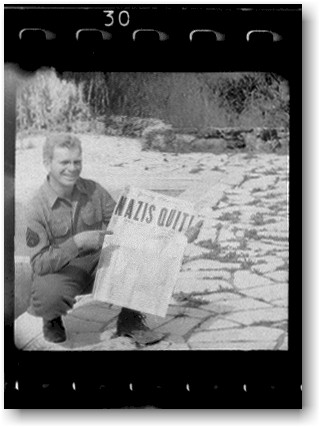
[Apparently they impressed my father enough for him to try a view shots of mountain scenes. - Wes, Jr.]
Some of the more ambitious fellows tried mountain climbing and fishing in the turbulent streams. The only nasty ripple on the otherwise smooth surface was the number of other units hemming us in on both sides. While sweating out as to whether it would be CBI or the occupation Army, on May 28th, be-gan a training program. We were back to smooth shaves, proper uniforms, classes and retreat. All this in a wheat field in Austria.
On June 5th the troop moved to Thundorf, Germany which is some seven miles west of Salzburg, The first platoon left the troop CP to guard the airport at Airning. The second platoon was detailed to guard the Rus-sian DP camp one mile from the airport. The third platoon remained with HQs for usual troop duties. We had good, comfortable billets and easy hours. We were prepared to sweat this mission out if it took all summer.
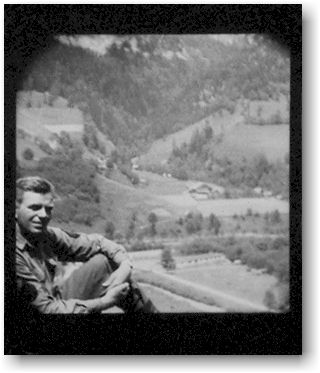
Beginning back at Piehl we sent a few men almost daily to visit Berchtesgaden. It was a disappointment as the Air Force and the French had nearly destroyed it. The place had been thoroughly looted in a manner to bring us to shame. In some of the rooms even the plaster had been torn from the walls by the angry French. Hitler's playhouse was not much.
[But it sure made for a great backdrop for a photo of Dad holding a newspaper which had as a headline, "Nazis Quit!" He penciled on the back of the contact print of this one, "This was a great day!" - Wes, Jr.]
Alternating with the trip to Berchtesgaden was the visit to the 20th Armored Division's rest camp at Prien on the Chiem Zee. Two men went at a time for sun bathing, boating, swimming, fishing and nearly everything not barred by the non-frat laws. Being out of uniform and plain loafing seemed the most popular with boating a close second. There were no restrictions on sleeping. All meals were served restaurant style on the terrace or in the dining room. When you had finished down to the cigarette and third cup of coffee a waiter removed the dirty dishes. The catch? It only lasted forty- eight hours.
It is rumor time in the division again. And they are just as vicious and flagrant as they were during our last days in Kentucky. Most tall tales nod toward the Pacific. That no one disbelieves. But the large questions seem to be, "Will it be by way of the States," and "When?"
The nicest bit of news we received about this time was that Tec 5s Holt and Kelley were on their way home. We had feared the worst but they had both been taken, prisoner and their greatest hardship seemed to have been the many miles they were forced to walk. That was during the end of the war when our armies were advancing so fast. They were released shortly after V. E. day.
On Monday, June 18th, we went to Camp Jones on the East shore of the Chiem Zee. Division was experimenting with task forces. We were- known as Task Force C and included all the C units of the various battalions in the division. We came for a week's maneuvers. The camp was named in honor of Col. Jones, one of our combat commanders, who was killed during April.
Our tents were in a high hayfield overlooking the Zee. To the South the Jong belt of the Alps ran parallel. The weather remained good. On the whole the problems were not too successful. Two years of this sort of thing in Kentucky plus a session of combat was not conducive to our best efforts. It was too much of an anti-climax.
[It may have been at this location that Dad took these images of his tent and the local farmers. Even tried a bit of farming himself, apparently. - Wes, Jr.]
On June 25th we returned to Thundorf. Our mission was to pack, and prepare for redeployment to the Pacific. It became known that we would go by way of the States and pause for that thirty day refresher course in how to enjoy civilian life. That was such sweet music. Then came the personal plans and the, "Hey, Joe, what are yuh gonna do?" and the inevit-able answer, "And then I'm gonna set down my duffle bag."
Tec 4 Overn Larson was welcomed back from the hospital. His shoulder was coming along nicely and we were glad to see him back.
On June 27th Captain Carlson and T/Sgt. Leslie were awarded the Bronze Star for meritorious service. The troop held a dress formation and the presentation was made by Lt. Col. Walton, Squadron Commander.
In the midst of our packing and preparation on July 7th Lt. Cornelison and Tec 4 Cooper took off for the States as our advance detail. Their smiles were something to see. We wished them Godspeed and prayed it wouldn't be too long before we followed them.
Three days later Tec 5 Hildren Packard returned from the hospital. We were beginning to wonder if we would sail without him. His hand looked good and we were happy to have him back.
July 12th was the great day. We were on our way home. That morn-ing we left Thundorf for the five mile truck ride to Teisendorf and our rail-road cars. As we pulled out in 40 and 8s that afternoon we wildly resembled our fathers and uncles of another European war. The outer walls of our Side door Pullmans were covered with more or less racy, chalk written slogans.
Four days we bumped along in our clumsy, flat wheeled cars. Our Air Force and artillery had accomplished an exceptionally good job of de-stroying the Kraut's rail centers. So because of necessity we were shuttled and rerouted across half of Europe, or so it seemed.
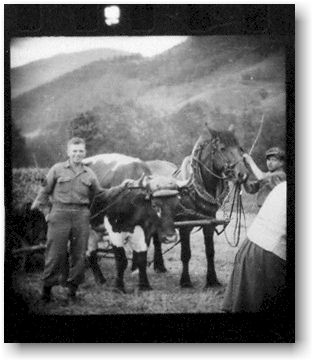
The 16th brought us, to Lucky Strike, the Le Havre staging camp.
While there it was mostly sit and wait for a boat to take us back. Then on the 24th the First Sergeant filled out the last Morning Report in the E.T.O. and the next day we were aboard the U.S. Navy transport "Hermitage" out of Le Havre and bound for the port of New York.
Some of the fellows had a difficult time going up the gangplank what with their loot and all. Swords, guns etc., were protruding from the tops of duffle bags and nudging people here and there. But we were a jolly crowd, and who minded the load?
The return trip was almost pleasant. The sea was calm - the weather held - and the food was good. The most jarring note of the entire voyage was the Navy's persistent yearning to keep a clean ship. They would chase us below while they swamped the decks; then run us topside to sweep the companionways. When they weren't otherwise engaged they whiled away dull moments chipping paint. No nap again this afternoon.
And then one day there was the Jersey coast just off our port bow. She was right where the Skipper said she'd be. At the entrance to, the lower harbor the Navy Blimp met us and trotted overhead till the ferry boats came alongside to take over. A WAC band on the Starboard vessel and GI swingsters on the Portside. The Army always sends two boats to welcome you home. The general idea is to prevent the steamer from becom-ing a reasonably accurate facsimile of the Leaning Tower of Pisa. Didn't those "Welcome Home - Well Done" signs look good?
Pier 88 at 48th Street and the Hudson River was colorful in red, white and blue bunting. Another band played good old hometown music. The tugs surged against us, someone threw a rope and We were in. And in case you might have forgotten it was 1300 hours, 2 August 45.
Under the shed once more the Red Cross came through with refresh-ments again. Then the ferry ride to Jersey and the railroad to Camp Kilmer. Twenty-four hours later we were knotted in small groups saying goodbye and wishing everyone a good furlough. It was HOME for thirty days and then the reassembling at Camp Cooke, California.
Furlough time would have been intermission in this chronicle. Part two was meant to be the War in the Pacific. Thankfully we bow our heads that that chapter will not have to be written.
THE FOLLOWING ARE A FEW
OBSERVATIONS AND ANECDOTES THAT WERE CHRONOLOGICALLY IMPOSSIBLE TO INCLUDE
INTO THE FOREGOING PAGES:
Somewhere along the road we reconnoitered a woods by fire. Out came half a company of Krauts, their hands in the air. Also frightened by the probing shots a young deer left his thicket to gallop across our front. All guns immediately changed targets while the obliging enemy lined up and patiently awaited our pleasure. P.S. The deer gained the concealment of the next woods.
On another day there was the gratitude of two camps full of impris-oned Russians. Then there were American and Canadian PWs to be liber-ated. It was embarrassing to be carried on their shoulders especially when they needed what little strength they had. Those things are hard to forget.
In one town all the people were crying as we entered, It seems as if their local news source told them the Russians were at the very gates of their city. We still don't know if those tears represented relief that we got there first or fear we would leave and allow the Russians to enter.
Did you ever see a man trying desperately to remove a glass eye to prove he was 4F and no Deutsche Soldaten? Or a man jabbing his wooden leg with a knife for the same reason?
Why does it always rain when we are about to move? Or should it be, why do we always move when it rains? If it isn't raining here we mount up and go someplace where it is.
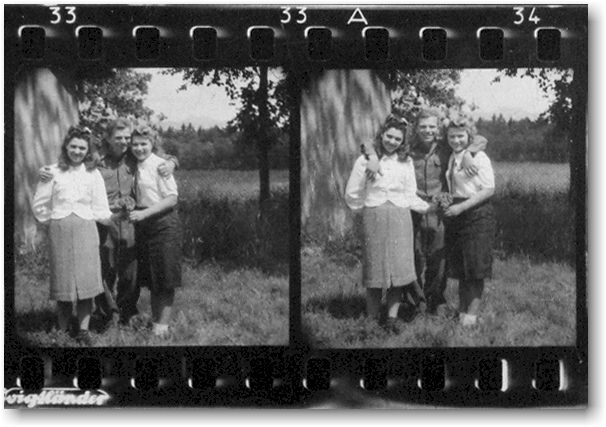
The attitude of the German people toward their own war has been puzzling. In the rural areas they didn't seem to care much which army slept in their beds. In the cities we encountered base indifference, open acceptance and downright hostility. [The country seemed to be a bit more friendly, judging from the photo. - Wes, Jr.] We even had children and girls foolishly stick their tongues in our direction. We usually replied with a large sized "BOO." The people's emotions in Germany were far different than those of the people of France. There only the Franc mattered.
The German soldier must never have had a Saturday morning Orien-tation hour as he never heard of Lidice, Lublin, Dachau or Bachenwald. He swears he never shot an American prisoner. Prison camp food was always as good or better than Army chaw. He also believes that but for Russian trickery and unfair practices he would be in Moscow today. It is too bad because those who are still alive will probably spend the rest of their lives never knowing why we were all so mad at him. Poor fellow. Someone should have told him.
"Boy, hand me my number three iron." So said a sentry on outpost speak as he blasted away with birdshot then altered to carbine and 50 caliber as the shadowy figure began gaining yardage.
Two officers and eight EMs had a nice excursion on May 21st. Their original mission was to seek a route for the Division to move into Italy. Marshall Tito, who was the cause of our trouble, came to terms while our party was enroute so the remainder of the expedition became a jaunt. They saw a few miles of Italy and a yard or two of Yugoslavia. One of the sights along the road was one of Adolph's legalized Mother Farms. It was OFF LIMITS. But it was just as well as it was quite apparent no further stud assistance was needed.. They returned May 23rd with the report of good hospitality shown them by both the English and Russian armies.
One afternoon while the lead was flying the tallest man in the troop, 6' 4," saw he was gaining little exposing himself along the road. With waving six-gun he routed two Germans from the safety of their double foxhole and immediately took possession. Was his face red when the hole only covered him to the knees.
Towards the end of the war we pushed an enemy anti-tank company so steadily they were forced to abandon their field pieces and escape on the unburdened prime movers.
Usually when you shoot a man in battle you don't care to move in for a close examination of the corpse. But two troopers found the suspicious bulge under his coat to be two bottles of champagne.
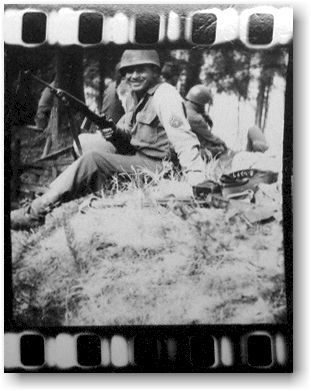
During an alert one night a platoon leader squirmed from his sack and without pausing for clothes snatched his pistol and dashed to direct his de-fense. We are not overly shy about the state of a fellow's undress but we gently urged him to cover. His white long johns flashing in the moonlight were giving our positions away.
MINUTE MEMORIES
Listening to straight musical broadcasts over AFN without the annoyance of petty commercials. Our radios were liberated jobs. The best the town had to offer.
The comic railroads and their awkward coaches. Four wheeled box cars with every other wheel flat.
Our morale the day we were given a definite mission to the CBI. The worrying as to our probable route.
The constant daily anxiety wondering if this were the time our luck would run out. The thought that out of so many bullets it only took one. You never knew if they had made the one with your name on it yet.
Looting was a heady experience. It grew in direct proportion to your accumulations. And then the bartering and exchange. That was where you saw haggling brought out to a fine degree.
We learned that speaking English with a French or German accent got us nowhere. But then neither did our embryonic dialect picked up from Army handbooks. Most of us fell back on sign language which isn't so bad.
Who needs to remind you of the food on the "Barry"?
What about the beauty of Bavaria where the rolling plains leaped prematurely into the Alps. Or moonlight on the Chiem Zee. Or the sun gleaming from the sails of the yawls from the Rest Camp. The Autobahn on a clear day and a heavy foot on the throttle. What about the mountain streams rushing frothy white from the snow capped peaks. The pine clad slopes. The quaint houses and the curious peasants.
Remember the nights on guard, the mud, the forced marches, the rain, and who wants to think of rations K and C?
How about sweating out letters from home and trying to find an opportunity to answer them.
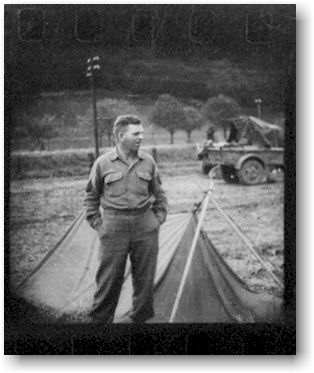
What about the censor's tongue and the taste of glue.-
Was your face red the first time you used a public urinal in France? The private ones were little better.
Can you remember how much a Franc was worth?
What about your welcome home that only a place like the States could give you? New York harbor looked plenty good. Even without the decora-tions it was home. And when you knocked at your door at home and the one who really mattered was waiting with her hand on the knob.
We were lucky. We got back. We shared an experience that need happen only once in a normal lifetime. We won't forget it and yet who wants to go back? Home is where the heart is, they say, so let's nail ours over the front door, and then in the years to come there will be nights at the Ritz bar or in the back room of Joe's when our better liars will flex their muscles and soar. Someone once said, "Hyperbole is the art of the theater," but C Troop, the great levelers, will free exaggeration from its moldy niche and make it readily digestible to the average man holding a short beer. On these not too rare nights you will hear ideas expressed which these poor pages never dare approach. Listen well. They will be worth hearing. But aimed at the degree of earthliness in all of us this CP to CP account will act as a checkrein upon your imagination or provide you with the exact date of your legendary missions and fancied encounters. . . It all depends on what type of a person you are.
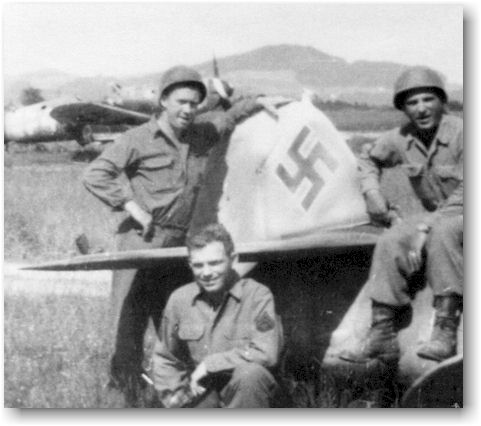
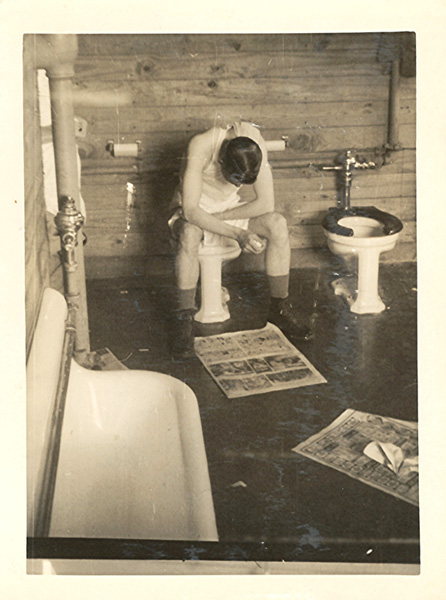
TROOP ROSTER
OFFICERS
Gordon N. Carlson, Captain, 26 Cottage place, East Orange, N. J.
Richard H. Cornelison, 1st Lt., 134 Compton, San Antonio, Texas.
Donald S. Warnock, 1st Lt., 764 Scotland Rd., South Orange, N. J.
George R. Merrifield, 1st Lt., 13705 Shaker Blvd., Cleveland, Ohio.
Richard L. Embry, 1st Lt.. 5209 Wabash, Kansas City, Mo.
ENLISTED MEN
FIRST SERGEANT
Norman A. Taranto, Franklin Avenue, Wyckoff, N. J.
TECHNICAL SERGEANT
Wilbur J. Leslie, Box 91, Cherokee, Okla.
STAFF SERGEANTS
Alvin Lewick Jr., Lincoln, Kansas.
Harold J. Magill, 5734 N. Front St., Philadelphia, Penn.
Edward J. Masterson, 3437 92nd Street, Jackson Heights, L. I., N, Y.
Albert O. Peterson, 3712 Olive Street, Htg. Park, Calif.
Merle C. Salmons on, 2218 Durant Street, Berkeley, Calif.
James J. Stanford, 4 Peck Avenue, West Haven, Conn.
Eugene P. Watson, 1817 Quintard Ave., Anniston, Ala.
SERGEANTS
Dalton D. Burt, Box 384, Fort Scott, Kansas.
Joseph Cilia, 1116 Samuel Street, Louisville, Ky.
Bernice F. Davis, Route 2, Graham, Mo.
Everett L. Forrest, Hillsboro, Mo.
Hughey C. Kreiser, 1008 W. Main St. Palmyra, Penna.
Irvin L. Piell, Frenchtown, N. J.
Joseph F. Presti, 60 Clark Street, Garfield, N. J.
Campbell H. Standifer, Route 1, Harrogate, Tenn.
William D. Williams, Box 2, Malad, Idaho.
Richard K. White, 1007 Washington St., Waterloo, Iowa.
TECHNICIANS FOURTH GRADE
Charles E. Angus, 20.6 2nd Street, Holden, Mo.
Albert E. Cooper, 122 W. Cleveland, W. Plains, Mo.
Robert J. Coulter, 508 Oak Street, Grand Forks, N. Dak.
Berton Durdle, 31-1/2 Harber Street, Chatham, Ontario, Canada
John V. Glenn, Arcola, Mo.
James W. Kennedy, 237 Sunnyside Ave., Brooklyn, N. Y.
Orven T. Larson, Bottineau, No. Dak.
Sanford B. McInteer, 729 Oakland, Topeka, Kans.
Anton F. Michna, Route 2, Wharton, Texas
Howard B. Page, Euingham, Kans.
Stanley Pische, 4839 W. Armitage, Chicago, Ill.
Gordon W. Smith, 1413 W. Cleveland, Montebello, Calif.
Kenneth R. Warner, Route 2, Hickory, Ky.
Francis J. Cella, Route 2, Chesterfield, Mo.
CORPORALS
Warren L. Beson, 2504 Girard Ave. Minneapolis, Minn.
Alfred P. Blocker, 268 NW 25th St., Miami, Fla.
Cue R. Chandler, Rt. 6,Box 432, Charleston, W. Va.
Edward J. Janikiewicz, 2310 Duncan St., Philadelphia, Penna.
Donald M. Kaffer, 310 Midland, Ave., Jolliet, Ill.
Fred K. Larson, 5702 S. Bishop St., Chicago, Ill.
Robert F. Miller, 5156 Avenue N, Great Falls, Mont.
John F. Morton, 1619 W. 29th St., Sioux City, Iowa.
Myron J. Penty, Center Road, North Randall, Ohio.
William A. Scharin, 740 Snediker Ave., Brooklyn, N. Y.
Bertram E. Smith, 1700 Clinton Ave., Minneapolis, Minn.
Oresto P. Tollis, 218 W. Main St., Florence, Colo. -
John J. Walicek, 370 S. Ferree St, Kansas City, Kans.
TECHNICIANS FIFTH GRADE
Thomas J. Anderson, 129 S. Chapel St., Newark, Dela.
Alvin A. Bean, 707 A St. NE, Washington, D. C.
Robert W. Blood, Milford, Penna.
Albert F. Campbell, Route 1, Cleveland, Miss.
Wesley H. Clark, 313 Eckford
St., Brooklyn, N. Y.
William D. Cooper, 7424 21st Ave., Brooklyn, N. Y.
Harry H. Emory, St. James, Mo.
John Esposito, 671 Rockaway Ave., Brooklyn, N, Y.
William R. Gerlach, 41 Menehan St., Brooklyn, N. Y.
Hurchel D. Guy, Route 1, Senath, Mo.
Donald B. Hammer, 4834 Grand Ave. S Minneapolis, Minn.
Arthur Helseth, Watford City, No. Dak.
Herman Hollander, 29 Bowee Place, Passaic, N. J,
Edward L. Holt, Newton Falls, Ohio.
Lloyd Igo, Belle, W. Va.
William P. Kanan, 30 E. 32nd St. Kansas City, Mo.
Lewis C. Keilsmeier, Eldora, Iowa
Raymond L. Kelley, Leavittsberg, Ohio
Raymond A. Lewis, Box 261, Kelso, Washington
James T. Lovinggood, 522 N. 68th St., Birmingham, Ala.
Drew W. Malcolm, Route 1, Monroe, Ga.
Alexander Manolt Jr., 9242 190th St., Hollis, N. Y.
Fred McCoy, Route 2, St. Joseph, Mo.
Bernard A. Murray, 86 Steuben St., Addition, N. Y.
Richard Nixon, 543 Fernon St., Philadelphia, Penna.
Oscar E. Noderer, 2234 Wickend Ave., Baltimore, Md.
Hildren G. Packard, Hebron, Maine
John H. Pardi, Route 4, Frankfurt, Ky.
Everett F. Peterman, Bluefield, W. Va.
Willie P Robison, Route 1, Newnan, Ga.
Michael A. Ross, 381 Oaks St., Passaic, N. J.
Donald R. Russell, Box 365, Hawkins, Texas
Malcolm H. Seay, Route 1, Hacoda, Ala.
John E. Sessions, Hitchata, Okla. -
Norman L. Sobraske, 4919 Chicago Ave. S, Minneapolis, Minn.
Melbourne Stocker, 227 Washington St., West Pittston, Penna.
LeRoy L. Swanson, 5347 Chicago Ave. S, Minneapolis, Minn.
James W. Testerman, Route 1, Neosho, Mo.
William Vahaly, 116 Kent St., Brooklyn, N. Y.
Lawrence G. Vassar, 15 So. Chaplin, Pawtucket, R.I.
William P. Vollmer, Route 1, Porterfield, Wisc.
Richard A. Whelan, Clay, Kentucky
William Workman, 6840 S. Wabash Ave., Chicago, Ill.
PRIVATES FIRST CLASS
Eugene E. Andrews, 10 W, Irvington Pl., Denver, Colo.
Robert Anik, 251 W. 71st St., New York, N. Y.-
Franklin N. Battis, 216 Poplar, Wilmington, Dela.
Charles B. Billberg, 2138 Clifton Ave., Chicago, Ill.
Charles H. Desch Jr., 114 Parsons Drive, Hempstead, N. Y.
Richard F. Dugan, 48 N. 21st Street, Newark, Ohio
Orland Fiandaca, Poughkeepsie, N. Y.
Salvatore P. Fortuna, 21 Olmsted St., East Harvard, Conn.
Eugene Gellman, 2113 Avenue V., Brooklyn, N. Y.
William J. Guthrie, 411 Poplar St., Madison, Indiana
Verne N. Hoar, Mayflower Apts., Madisonville, Ky.
John W. Ingram, 1438 Central Ave. Connersville, Ind.
Harley E. Joseph, 12 Beech Ave., Aldall, Penna.
Dickie Keith, McAllister, Okla.
Arthur H. Levere, 1277 E. 46th St., Brooklyn, N. Y.
Wilbur E. Lewis, Box 311, Newport, Tenn.
Salvador Lucchese, 20A, Sanchez, San Francisco, Calif.
James M. Lucas, Route 2, Warren, Penna.
Leo L. Manis, Madera, Calif.
Albert G. Miller, 2914 W. 23rd St., Brooklyn, N. Y.
Charles P. Uaduano, 136 Bayard Ave., Brooklyn, N. Y.
Vincent D. Paquale, 701 Adams St., Hoboken, N. J.
William J. Rauchorst, 725 Wall St., Akron, Ohio
David W. Requa, 5 Bogart Ave., White Plains, N. Y.
Basil P. Rozdilski, 190, 1st St., Wilkes-Barre, Penna.
Vito J. Rubino, 31305 Princeton Ave. Chicago, Ill.
Albert G. Scarbrough, Route 2, Box 25, Climax, Ga.
Elbert R. Steen, Route 1, Leachville, Ark.
Ralph Stein, 1395 Levington Ave., New York, N. Y.
Stuart C. Taylor, 325 Linden St., Winnetka, Ill.
William A. Watts, 209 E. John St., Champaign, Ill.
PRIVATE
Alfred Allen, Philadelphia, Penna.
Adrian Garcia, Alameda, New Mexico.
James R. Henry, Clinton, Iowa.
Chester M. Lewis, 374 Bayside Drive, Detroit, Mich.
John Madonia, 2725 Harway Ave., Brooklyn, N. Y.
Gregorio Melendez, 4532 E. 2nd St., Los Angeles, Calif.
Frank A. Natale, 2941 West Federal St., Youngstown, Ohio
Lonnie Overstreet Jr., Route 1, Syvannia, Ga.
Elpidio G. Reyes Jr. 121 Hill St., San Antonio, Texas.
John O. Sexton, 1816 Centre, Brooklyn, N. Y.
Robert G. Show, Box 146, Bladenboro, North Carolina.
Harold A. Smith, Route 2, Cedar Springs, Mich.
Richard A. Wise, Washington State.
Carmen J. Zannitto, 27 Barrett St., Schenectady, N. Y.
Anthony J. Zidonis, 4614 Wood Avenue, Parma, Ohio.
MEDICS
Cpl. Jake W. Poole, Route 2, Section, Alabama.
Pfc. Arthur E. Borchert, 34th & Chestnut, Kansas City, Mo.
From the Adjutant General's Office, "Battle Deaths of the 20th Armored Division," 8 Oct 47, as of 30 Jun 47. Unpublished, Washington National Records Center. Battle Deaths from the 33rd Cavalry Recon Squadron: Bacon, Wesley H./T/5/KIA/28 Apr; Graber, Harold E./T/5/KIA/30 Apr; Palmer, Bryant L./T/5/KIA.
From unpublished Unit Histories, After Action Reports and General Orders in the Washington National Records Center: Moncton, Robert L/CPL/ was awarded a Silver Star Medal.
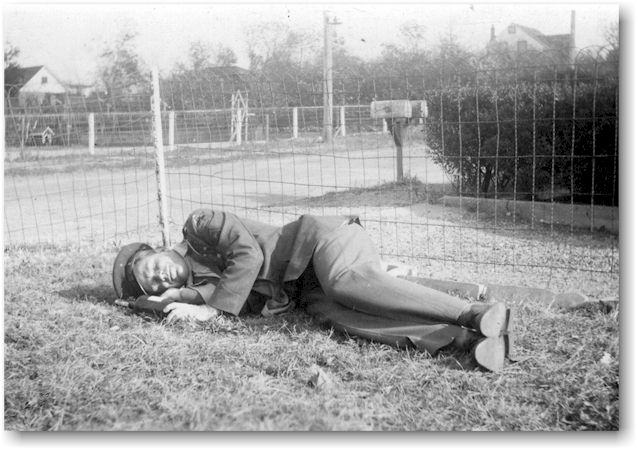
Back home in Brooklyn, New York. A well-deserved nap.